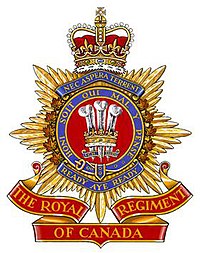The Royal Regiment of Canada
| Royal Regiment of Canada | |
|---|---|

Cap badge of the Royal Regiment of Canada.
|
|
| Active | 1862–present |
| Country |
|
| Branch |
|
| Type | Infantry |
| Size | One Battalion |
| Part of | 32 Canadian Brigade Group |
| Garrison/HQ | Fort York Armoury, Toronto |
| Nickname(s) | The Royals |
| Motto(s) |
|
| March |
|
| Commanders | |
| Commanding officer | LCol Tom Payne |
| Regimental sergeant major | CWO Vishnu Persaud |
| Colonel-in-chief | HRH The Prince of Wales |
 |
|
| Location | Fort York Armoury, 660 Fleet Street West, Toronto, Ontario, Canada |
|---|---|
| Type | Regimental Museum |
The Royal Regiment of Canada is a Primary Reserve infantry regiment of the Canadian Army based in Toronto, Ontario, part of 4th Canadian Division's 32 Canadian Brigade Group. Today, the regiment has a total of three companies:
Additionally there are two Army Cadet corps that wear the Royal Regiment of Canada cap badge:
The ceremonial dress uniform of the Royal Regiment of Canada is the scarlet tunic and bearskin similar to that of the British Army's Grenadier Guards. The plume is red over white similar to the former Canadian Guards regiment.
The 10th or Royal Regiment of Toronto Volunteers was called out on active service from 8 to 31 March and from 1 to 22 June 1866. The battalion served on the Niagara frontier.
The 10th Regiment, Royal Grenadiers was Called to Arms on 27 March 1885 and mobilized detachments for active service on 10 April 1885 which served with Middleton's column of the North West Field Force, until they returned from active service on 24 July 1885.
The 10th Battalion Royal Grenadiers contributed volunteers for the Canadian Contingents during the South African War.
Details of the 10th Regiment Royal Grenadiers were placed on active service on 6 August 1914 for local protection duties.
The 3rd Battalion (Toronto Regiment), CEF was authorized on 10 August 1914 and embarked for Great Britain on 26 September 1914. It disembarked in France on 11 February 1915, where it fought as part of the 1st Infantry Brigade, 1st Canadian Division in France and Flanders until the end of the war. The battalion was disbanded on 15 September 1920.
The 58th Battalion, CEF, was authorized on 20 April 1915 and embarked for Great Britain on 22 November 1915. It disembarked in France on 22 February 1916, where it fought as part of the 9th Infantry Brigade, 3rd Canadian Division in France and Flanders until the end of the war. The battalion was disbanded on 15 September 1920. Its battalion history is captured in the book, "Second to None" by Kevin Shackleton.
...
Wikipedia
